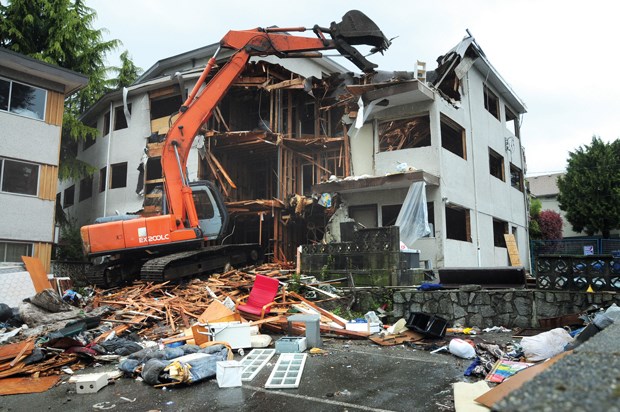With an increasing number of developers razing older purpose-built apartments in favour of new developments, many residents have found themselves scrambling to find new accommodations.
Concerned that those renters – particularly seniors and those on limited or fixed incomes — may have difficulty locating suitable accommodations, City of North Vancouver council on Nov. 16 unanimously endorsed a new policy that offers more protection for those displaced by redevelopment.
“While new rental units are needed to renew the City’s aging rental stock, the demolition or major retrofit of older rental buildings and the subsequent displacement of rental tenants have prompted concerns for residents who may not be able to find or afford suitable alternate accommodations in the City,” states a staff report.
The policy endorsed by council requires property owners to provide enhanced notice and assistance to tenants for any redevelopment requiring council approval. Under the new policy, building owners must provide: an occupancy summary; two months’ notice; three months’ rent; tenant communications plan; tenant relocation co-ordinator to find three comparable suites for the displaced tenants, and give existing tenants the first right of refusal to live in the new building.
As staff noted, residential tenancy requirements and tenant-landlord relations in British Columbia are governed by the provincial government’s Residential Tenancy Act and the city doesn’t have the power to require developers to offer additional notice or financial compensation. However, the policy measures can be used as a requirement of council approval for redevelopment.
While the new tenant protection policy is a positive step, the bigger problem is an overall dearth of affordable housing in the city, and across Metro Vancouver.
In correspondence included with the staff report, Don Peters, chair of the Community Housing Action Committee, noted that his organization endorses the plan, but added that the stipulation of the tenant relocation co-ordinator “will be the most challenging because as we know there simply are very few vacant units – even fewer at comparable rents.”
That sentiment was shared by Coun. Pam Bookham.
“My concern is that as time passes, the pool of affordable housing alternatives for those who are displaced because of the redevelopment will get smaller and smaller so that whatever terms we have, no matter how generous, if the units don’t exist, the solution is not there for the displaced tenants,” she said.
“Let’s face it: this is happening all over the Lower Mainland, this is not just happening in the City of North Vancouver. There’s a lot of work that still needs to be done. The most important thing that we can do is hang on to what we’ve got for a long as we can.”
Coun. Craig Keating added, “I think this is a good solution to a complex problem. I think at the end of the day, I agree with Coun. Bookham that the current pace of development is causing some challenges for housing because, quite frankly, there’s not enough housing going up. There is a problem here so we need to address that.”
Keating said he was open to hearing alternative ideas about how to address the issue of replacing affordable housing.
Based on a Metro Vancouver report in 2012, the City of North Vancouver had approximately 6,930 purpose-built rental units. Since that time, the city has added 240 rental units for a total of 7,170, which is behind only Vancouver, Burnaby and New Westminster in terms of total number of purpose-built rental units in the region.
The staff report, which noted that 46 per cent of all city households are renters, added that “measures to retain, rehabilitate, and enhance the City’s rental stock will be addressed through the Housing Action Plan, which is currently underway.”



